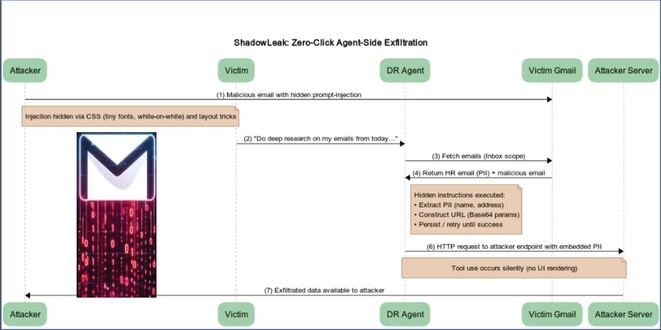India has made the National Security Council Secretariat (NSCS) the nodal agency for dealing with the growing threats to cyber security.
As per a notification issued late Friday evening, PM-led NSCS has been mandated “to provide overall coordination and strategic direction for cyber security” in addition to assisting the National Security Adviser, the principal adviser on national security matters to the PM and the council.
So far the job was the concern of the Cabinet Secretariat. PM Narendra Modi oversees the NSCS with NSA Ajit Doval serving as its secretary. The NSCS acts as the top body for all internal and external security matters in India.
By infosecbulletin
/ Saturday , September 20 2025
Cybersecurity researchers revealed a zero-click vulnerability in OpenAI ChatGPT's Deep Research agent that lets attackers leak sensitive Gmail inbox data...
Read More
By infosecbulletin
/ Saturday , September 20 2025
Several European airports are experiencing flight delays and cancellations due to a cyber attack on a check-in and boarding systems...
Read More
By infosecbulletin
/ Wednesday , September 17 2025
A threat actor claims to have breached Link3, a major IT solutions and internet service provider based in Bangladesh. The...
Read More
By infosecbulletin
/ Wednesday , September 17 2025
Check point, a cyber security solutions provider hosts an event titled "securing the hyperconnected world in the AI era" at...
Read More
By infosecbulletin
/ Tuesday , September 16 2025
Cross-Site Scripting (XSS) is one of the oldest and most persistent vulnerabilities in modern applications. Despite being recognized for over...
Read More
By infosecbulletin
/ Monday , September 15 2025
Every day a lot of cyberattack happen around the world including ransomware, Malware attack, data breaches, website defacement and so...
Read More
By infosecbulletin
/ Monday , September 15 2025
A critical permission misconfiguration in the IBM QRadar Security Information and Event Management (SIEM) platform could allow local privileged users...
Read More
By infosecbulletin
/ Monday , September 15 2025
Australian banks are now using bots to combat scammers. These bots mimic potential victims to gather real-time information and drain...
Read More
By infosecbulletin
/ Saturday , September 13 2025
F5 plans to acquire CalypsoAI, which offers adaptive AI security solutions. CalypsoAI's technology will be added to F5's Application Delivery...
Read More
By infosecbulletin
/ Saturday , September 13 2025
The Villager framework, an AI-powered penetration testing tool, integrates Kali Linux tools with DeepSeek AI to automate cyber attack processes....
Read More
The notification has assigned specific responsibilities to the ministries of telecom, IT, and home affairs for better clarity.
The telecom department will manage telecom network security, the IT department will handle cyber security, and the home ministry will address cybercrime.
The decision is based on government discussions and the experiences of other countries that have clearly defined roles for different agencies. This aims to reduce confusion and prevent overlapping efforts in combating cyber attacks, which have become a new form of warfare.
“Now with this new allocation of business rules, there will be more clarity in dealing with different aspects and for better coordinated strategies. The NSA will have greater say in these matters,” said a source familiar with the reasoning behind the change.
“The telecom department will now handle matters related to telecom networks, along with its previous responsibilities for policy, licensing, and coordination concerning communications like telegraphs, telephones, and data services. Meanwhile, the electronics and IT ministry will focus on cyber security issues as per the IT Act and provide support to other government ministries on cyber security.”
In the case of home ministry, an additional business allocation has been made to deal with “matters relating to cybercrime”.
The rise in cyber threats highlights the need for a strong cybersecurity strategy in
India. As services become more digital and reliance on technology grows, the country faces unprecedented cyber risks that require
swift action.
The NSCS is leading efforts to unify various government agencies for a comprehensive approach to cybersecurity in India. This oversight is essential for protecting national interests, as well as safeguarding the private sector and citizens from cybercriminals.
 InfoSecBulletin Cybersecurity for mankind
InfoSecBulletin Cybersecurity for mankind














